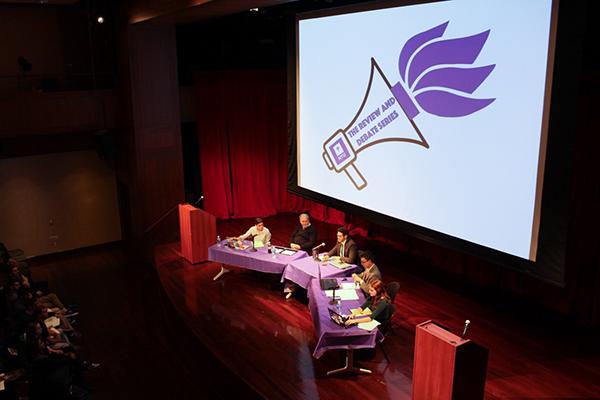Sexton, students talk religion’s place in society

The Sexton Debate: Is Religion a Force for Good in Global Society was held at the Kimmel Center 27th October, 2015.
October 28, 2015
Well known on campus for his religious involvement, including his class “Baseball as a Road to God,” President John Sexton took on students in a debate surrounding religion’s impact on society Wednesday night hosted by the Review and Debates organization.
The supporting side, led by Sexton and CAS junior Arianna Israel, was in favor of religious institutions, claiming it had a positive impact on society. The opposing side was led by CAS junior Wenbo Wang and LS sophomore Leah Block who highlighted religion’s tendency to create unnecessary conflict.
In an attempt to increase participation, members of the audience were encouraged to ask debaters relevant questions. At the end of the debate, the audience was to vote for which side they thought presented a stronger argument.
The event began with an opening statement from Sexton. His team focused the argument on organized religion — ignoring fringe religious organizations — and present-day snake person religion, as opposed to focusing on the traditions of past organized religion, which often draw flack for being outdated in a society that has made strides of progression in the last few centuries.
Sexton outlined four points that showed how religion has changed in modern society. He focused on the relationship between science and faith, tradition and progression, witnessing versus conversion of people and interfaith accord, ignoring any specific societal examples in the first round.
Sexton and Israel ultimately concluded their initial argument by saying religion animates people with a sense of purpose and fulfillment, and helps us recognize our dignity and the dignity of others.
“The positive impact of our faith is real,” Sexton said. “Without religion our world would be spiritually, morally and emotionally diminished.”
Wang, the leading speaker advocating against religion, and his team quickly refuted this, arguing that organized religion cannot be a force for good in society as it lags behind in granting individuals basic human rights and incites conflict.
“From the crusades to the conquest of the Iberian Peninsula to the Israeli-Palestinian conflict, even to the modern day, we’ve seen organized religion as a major instigator for conflict,” Wang said.
He went on to cite tensions in the Middle East as an example of the conflict caused by the existence of organized religion.
However, Israel disputed this, saying that the cause for individuals using religion as a force for evil comes mainly from an inherent power-hungry human nature.
“We think that these conflicts would arise similarly in a secular world because we see these as not being motivated by the things that religion teaches but rather that they are moderated by the religious teachings that religions primarily try to instill in their people,” Israel said.
Disagreeing with Israel’s assumption that the same evils the world sees now would be seen in a secular world, Block focused her argument on the dangers of blind faith. She linked the trend toward violence to the blind faith certain individuals have toward the demands of their God’s.
“The concept of blind faith is the one thing that separates religion from other social and political institutions in the secular world,” Block said.
Opinions about the debate varied, but third year law student Rodrigo Moncho expressed disappointment in the lack of clear answers during the lively question and answer round.
“I’m a pretty obnoxious atheist,” Moncho said. “The discussion never got to the point for me. Do you think that the death of thousands of people can be justified by the good that comes from religion? There’s no answer to that, that’s unfortunately my takeaway.”
Motivated to attend the event by the possibility of further debates outside of the Eisner Lubin auditorium, LS freshman Brendan Clark-Mets was in favor of the idea that religion can be a positive in society.
“I think that religion can be a force for good, I think when people can take themselves out of it,” Clark-Mets said.
The supporting side of the debate won by about 50 votes in favor of the motion.
Email Idalina Sachango at [email protected].
CORRECTION: A previous version of this article incorrectly referred to Ms. Block as a freshman.


























































































































































